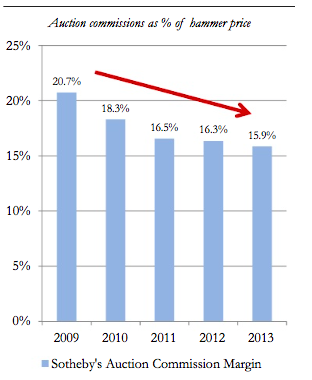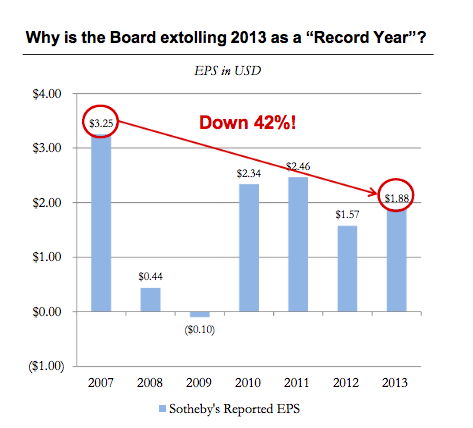
The Scream by Edvard Munch. Source: Wikimedia Commons.
After months of increasingly bitter verbal barbs, art auction house Sotheby's (BID +0.00%) said it's come to an agreement with its largest shareholder, activist investor Daniel Loeb, whose hedge fund, Third Point, launched a proxy fight earlier this year to have independent directors appointed to the board. It's a surprisingly quiet denouement to what was promising to be a raucous investor battle.
The heart of Loeb's complaint against Sotheby's was its failure to realize full value for shareholders, which may have been a surprise to some considering its shares hit all-time highs in March, but the hedge fund operator said the auction house was ceding too much ground to rival Christie's and leaving a lot of money on the table. Whereas Sotheby's was focusing on high-end clients and expensive lots, Christie's was left to chew up the lower end of the market.

Loeb's Third Point owns 9.6% of Sotheby's stock. He charged that although the auction house sold a greater dollar value of art in 2013 than in its previous high-water-mark year of 2007, it actually generated less revenue and spent more money to do so, much more meaningful benchmarks to compare its performance by and a much bigger indictment of management and the board. Ultra-high-net-worth individuals were amassing large amounts of wealth, so Sotheby's performance should have risen regardless, but as the art market was essentially flat from high point to high point, it suggests the auction house hasn't done enough to make the art market more accessible.
And contrary to common wisdom, 2013 wasn't a banner year for Sotheby's, as its earnings have tumbled 42% since 2007, going from $3.25 per share back then to $1.88 last year. Loeb charged that the underperformance was a result of poor corporate governance, a lack of expense controls, and a failure to expand its brand.

Source: Third Point investor presentation.
As a result, Loeb sought to have three nominees appointed to Sotheby's board (the auction house had previously offered him one). He believed three seats was appropriate given the current 12-member makeup.
The art house reacted forcefully. First it adopted a poison-pill defense, a move that would substantially dilute Loeb's ownership stake if he acquired any more of the company. Then it said the nominees he made to the board lacked any substantial experience in businesses like Sotheby's. They may be good at financial engineering, it said, but not in running an auction house. It also countered all the points the hedge fund operator made, claiming his representation on other boards was "self-interested," rather than serving the interests of the common shareholder.
Having gained approval of its shareholder rights plan last week, Sotheby's was rolling into its shareholder meeting tomorrow with some momentum at its back, so it may have come as something of a surprise that the two sides announced today that they had reached an agreement to avoid the proxy battle. While it suggests Loeb had more wind in his sails than he was given credit for, it doesn't appear he gained as much as he could have.
Under the terms of the agreement, Sotheby's will expand its board to 15 directors and will appoint all three of Loeb's nominees, including himself; Olivier Reza, a former investment banker and rare gem and jewelry collector; and Harry Wilson, a corporate restructuring expert. Additionally, Third Point will be allowed to buy as much as 15% of Sotheby's stock, and the annual shareholder meeting will be pushed back a few weeks.
Loeb wanted Robert A. Taubman, Daniel Meyer, and Jessica M. Bibliowicz all replaced, but they remain; he wanted CEO Bill Ruprecht to step down, but he stays on; and he wanted to ensure his voice wasn't diluted so he didn't want to be just one of 12 directors, now he and his fellow nominees will be three of 15. Sure, that's a better percentage, but not as powerful as it could have been. And while a 15% stake in Sotheby's is sizable, Loeb is still kept on a relatively short leash.
Loeb says he's already not considering himself a nominee but rather a member of the board and plans to act accordingly. And since Sotheby's had already nominated two new independent directors after initial discussions with Loeb and they'll be on the auction house's slate, it means there will be some fresh perspective given. Yet with as much staying the same as is changing, I just wonder how much higher the market can bid up these shares.
